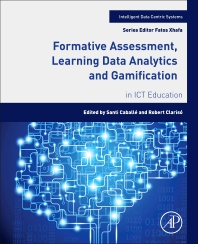LudifyME: An adaptive learning model based on gamification
F. Llorens-Largo, C.J. Villagrá-Arnedo, F.J. Gallego-Durán, R. Satorre-Cuerda, P. Compañ-Rosique, R. Molina-Carmona
Universitat d’Alacant, Alicante, Spain
En: Formative Assessment, Learning Data Analytics and Gamification. In ICT Education
Santi Caballé and Robert Clarisó (ed.)
Academic Press – Elsevier
www.elsevier.com
A huge progress is taking place in information technologies (IT) in recent years, and the education systems cannot remain unaware of these changes. IT allows a massive access to learning environments, as well as customization, enabling to attend the students heterogeneity, favouring a progressive, autonomous and adaptive learning. But all this transformation in the educational world will require advances in both theory and technology. New innovative teaching proposals that make use of new technologies have emerged, although they are usually based on ancient pedagogical principles.
A comprehensive understanding of the teaching-learning process, and a clear analysis of the value of information technologies along with the application of gamification principles and techniques, can give solutions to the current problems of the educational process. Some previous experiences with preliminary results endorse this hypothesis and enable us to face this challenge with guarantees. Our team, while researchers in the area of artificial intelligence, we are also computer science teachers. That is why we ask ourselves about the use of information technologies in education. And as far as possible we try to answer some of these questions: Are there appropriate pedagogical models for the digital world? Are teaching paradigms evolving keeping pace with technologies? Are we making full use of IT to improve these processes? Are we really achieving the goal of improving them?
In this sense, we propose an innovative gamified training model, LudifyME, with a strong technological component as support. The research focal point of this project is to develop a system that synthesizes the potential of gamification, that is at the essence of video games and that makes them powerful as learning catalysts. It is conceived as independent of existing eLearning platforms and easy to be embedded in any of them. Its main contribution is focused on the heavy use of methodological teaching principles to enhance student’s motivation, performance and satisfaction.
The chapter is structured as follows: in sections 2 and 3 the relationship between the concepts of learning, gamification and technology is introduced. From our point of view they are the key to develop an instructional, customized and student-centred learning model. In section 4 LudifyME is presented, our innovative proposal of an adaptive gamified learning model with a solid technical basis. In the fifth section, PLMan is detailed. It is a gamified online learning system that allows gathering data for experiments with LudifyME. In addition, the obtained results are shown and analysed. Finally, the conclusions drawn and lessons learned from this research are indicated.
